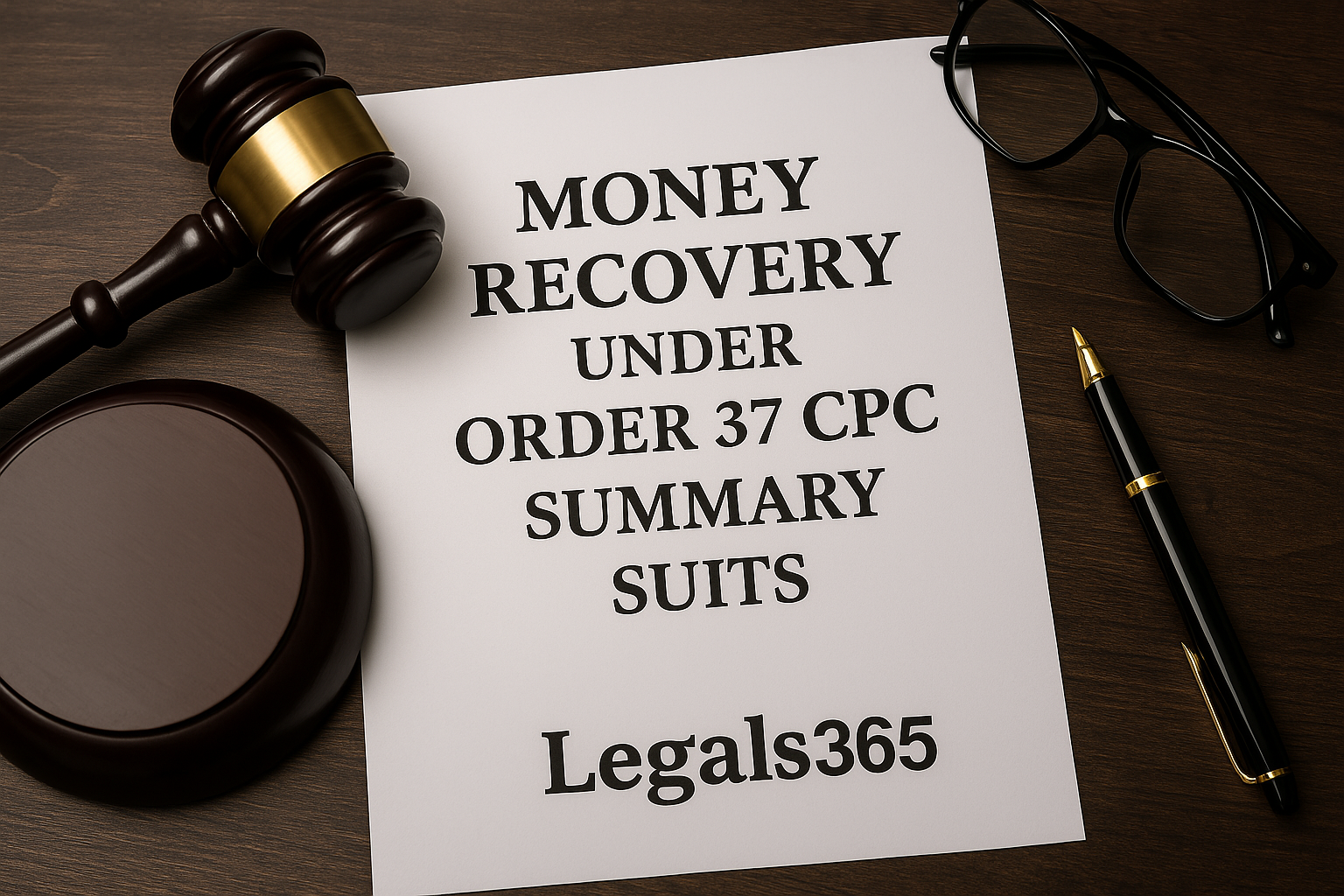
Money Recovery Under Order 37 CPC: Understanding Summary Suits
In the ever-changing landscape of legal proceedings, recovering money owed to you through a summary suit under Order 37 of the Civil Procedure Code (CPC) offers a streamlined and efficient process. This method of recovery has gained popularity due to its speed and simplicity, making it a go-to option for many seeking to reclaim debts. In this article, we’ll take a deep dive into what Order 37 CPC entails, how summary suits work, and how OnlineNoida can assist you in navigating this legal avenue.
Introduction: The Need for Speed in Legal Recovery
Dealing with a debtor who refuses to pay can be incredibly frustrating. It can lead to not only financial losses but also significant emotional distress. When traditional legal remedies seem cumbersome or slow, many individuals and businesses turn to summary suits under Order 37 of the Civil Procedure Code (CPC), which is designed to fast-track the money recovery process.
But why is this process so effective? It is simple: Order 37 suits allow a plaintiff (the person seeking recovery) to obtain a judgment in a short period, without the extended delays often associated with regular civil suits. However, understanding the intricacies of this process is essential to leveraging its advantages. Let’s explore this legal mechanism in detail.
What is Order 37 CPC?
Order 37 of the Civil Procedure Code provides a framework for summary suits. A summary suit is a legal action used for recovering money in cases where the defendant’s liability is clear and there is no reasonable defense. Under this order, the procedure is simplified and expedited, with fewer formalities compared to regular civil suits.
Summary suits are typically used for debt recovery, bills of exchange, promissory notes, or any claim where the plaintiff can produce clear evidence of the defendant’s debt. Unlike regular suits, summary suits aim to expedite justice by focusing on straightforward cases where the facts are not heavily contested.
Key Features of Order 37 CPC:
- Fast-Track Process: Summary suits are designed to be quick, with an aim to resolve matters within a short period.
- Minimal Evidence: The requirement for evidence is simpler, making it faster to prove a claim.
- No Oral Evidence: In many cases, the court doesn’t require oral evidence unless there’s a clear dispute over facts.
- Limited Grounds for Defense: Defendants in a summary suit have very limited grounds to contest the suit, which helps the process stay focused and efficient.
Types of Claims Suitable for Order 37 Suits
While Order 37 CPC is used for various claims, there are specific types of claims that are most commonly addressed through this procedure. Let’s look at the most typical ones:
1. Money Recovery from Bills of Exchange
A bill of exchange is a financial document used in international and domestic trade to secure payment. If a party fails to pay under the terms of a bill of exchange, the creditor can use Order 37 to recover the debt without a prolonged legal process.
2. Recovery of Promissory Notes
If a person owes money based on a promissory note (a written promise to pay a specific sum of money), Order 37 can be employed to obtain a judgment quickly. Since promissory notes are legally binding, the court generally favors the creditor.
3. Debt Recovery in Commercial Contracts
Commercial agreements often involve terms of payment. If a business fails to pay the owed money under the contract, a summary suit under Order 37 CPC can be used for rapid recovery.
4. Other Simple and Clear Debts
Order 37 suits are also applicable in cases where the debtor owes a sum of money under clear, undisputed terms. For example, unpaid bills, invoices, or loans can be recovered via summary suits.
How Do Summary Suits Work Under Order 37 CPC?
The process for filing a summary suit under Order 37 CPC involves several straightforward steps. Let’s break them down:
Step 1: Filing the Suit
The process starts with filing the plaint (the legal document that initiates the case). In this document, the plaintiff must state the cause of action clearly and provide evidence supporting their claim. The defendant’s obligation to pay and the non-payment must be evident from the documents attached.
Step 2: Issuance of Summons
Once the suit is filed, the court will issue a summons to the defendant. This summons directs the defendant to respond within a stipulated time frame, usually 10 days.
Step 3: Defendant’s Response
The defendant may either admit the claim or deny it. If the defendant admits the claim or fails to respond within the given time, the court may grant a judgment in favor of the plaintiff. However, if the defendant disputes the claim, the court may proceed to a hearing.
Step 4: Hearing
If the defendant contests the claim, the court will review the evidence and decide whether a trial is necessary. In most cases, the summary suit is decided based on the written submissions and documents without any oral evidence.
Step 5: Judgment and Execution
If the plaintiff’s case is clear and uncontested, the court will issue a judgment for the plaintiff. After the judgment, the plaintiff can begin the process of execution, which involves recovering the money through various methods such as attachment of property or garnishment.
Advantages of Filing a Summary Suit Under Order 37 CPC
There are several advantages of filing a summary suit under Order 37 CPC that make it an appealing choice for those seeking quick money recovery.
1. Speedy Resolution
One of the primary benefits is the speed of resolution. Since summary suits are streamlined and focus on simple cases, they usually take less time to resolve compared to traditional civil suits.
2. Simplicity
The legal process for summary suits is simpler and less formal, meaning plaintiffs can expect fewer procedural delays and complications.
3. Limited Defense Options for the Defendant
Defendants in Order 37 suits have limited options to contest the claim. If the plaintiff has solid proof of the debt, the defendant has little room to argue, leading to a faster judgment.
4. Reduced Legal Costs
Given the shorter timeline and simplified procedures, the overall cost of legal representation and court fees for summary suits is generally lower than for regular suits.
Challenges and Considerations
While summary suits offer a fast-track process, they do come with certain limitations and challenges.
1. Strict Criteria for Filing
Not all types of claims are eligible for summary suits. For example, if the claim involves complex disputes of fact or legal questions, it may not qualify for a summary suit.
2. Limited Scope for Defense
While the limited grounds for defense may seem like an advantage, it can also pose a challenge for defendants who may have a valid reason to dispute the claim but are unable to present their case in full.
3. Appeal Process
If a judgment is passed in favor of the plaintiff, the defendant can still appeal the decision. However, such appeals can delay the final resolution of the matter.
How OnlineNoida Can Help You with Money Recovery
When it comes to recovering money through a summary suit, it’s essential to have the right legal team by your side to guide you through the process. OnlineNoida offers comprehensive legal services that specialize in Order 37 CPC and money recovery suits.
With OnlineNoida, you can expect:
- Expert Guidance: Our team of experienced legal professionals will help you understand the nuances of filing a summary suit.
- Fast-Track Process: We focus on expediting the recovery process, ensuring minimal delays and maximum efficiency.
- End-to-End Services: From filing the suit to executing the judgment, OnlineNoida offers complete legal support to help you recover your money swiftly.
Conclusion: Efficient Money Recovery with Order 37 CPC
Recovering money through a summary suit under Order 37 of the CPC is one of the quickest and most efficient ways to settle disputes related to debts, bills, and promissory notes. The process simplifies legal proceedings and reduces delays, allowing creditors to focus on their core business rather than spending years in litigation.
If you are dealing with money recovery, consider leveraging Order 37 CPC for a fast and efficient resolution. For expert legal assistance, Legals365 and OnlineNoida is here to help you every step of the way. Contact us today to start your money recovery process.
Hashtags:
#MoneyRecovery #Order37CPC #SummarySuit #LegalRecovery #DebtRecovery #CivilProcedureCode #OnlineNoida #DebtSettlement #LegalAssistance #FastTrackJustice #SummarySuitProcedure #LegalSupport #BusinessDebtRecovery #FastMoneyRecovery #LegalExperts #OnlineNoida
